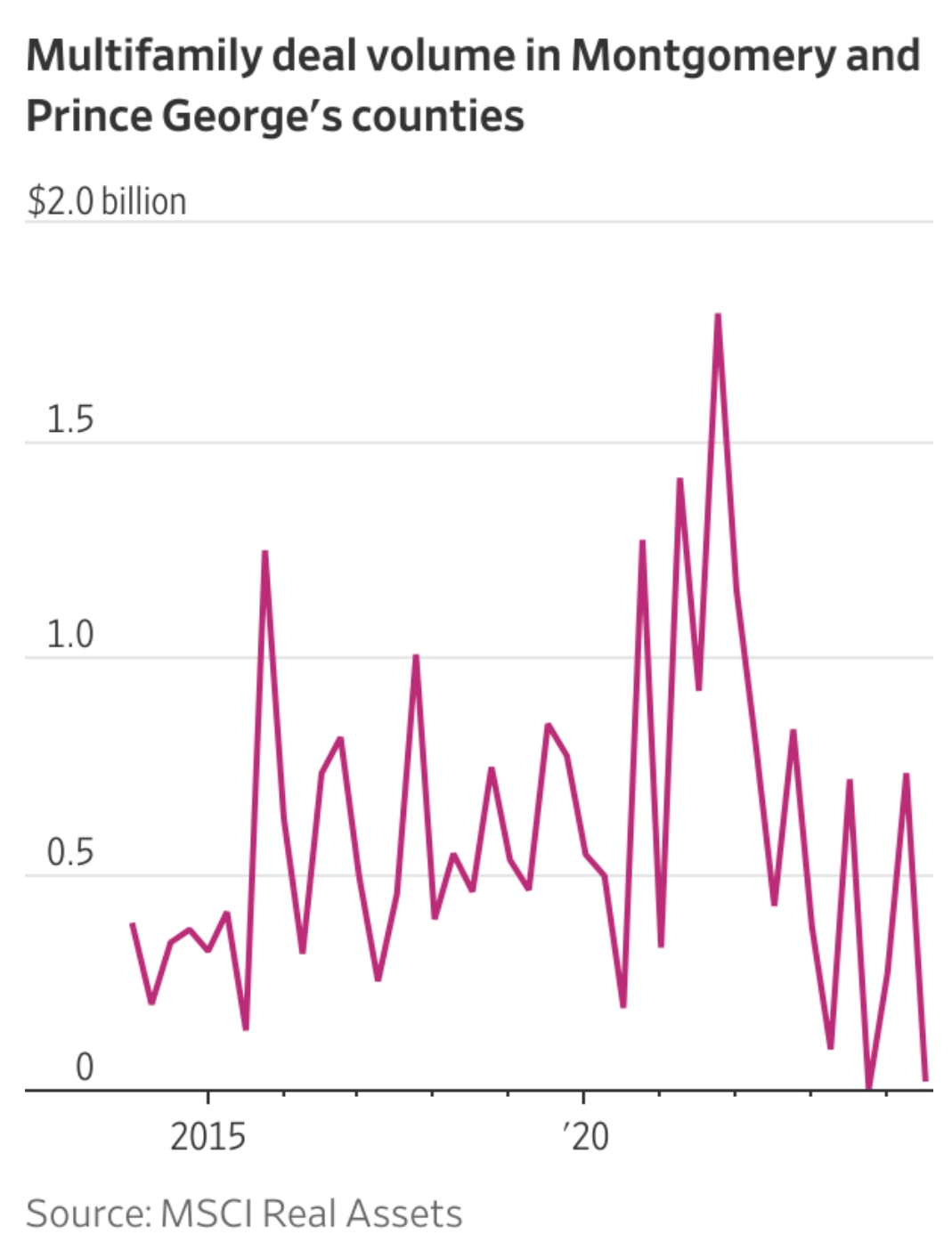By Adam Pagnucco.
On December 23, the Wall Street Journal printed the first assessment of rent control in Montgomery County since the law was passed in July 2023. And the first batch of data looks as terrible as it was predictable.
Rent control is one of the worst economic policies of the modern age. A huge trove of academic research has found that it discourages housing production, encourages conversion of apartment units into condos, raises rents in non-controlled units and is poorly targeted to low income renters. Takoma Park’s rent control law has shut down apartment construction there for decades. MoCo had rent control in the 1970s but got rid of it after thousands of condo conversions. Economists overwhelmingly oppose rent control and the county council’s own staff issued a warning about it right before the council passed it. Even the communist government of Vietnam abolished rent control, with its foreign minister famously declaring, “The Americans couldn’t destroy Hanoi, but we have destroyed our city by very low rents. We realized it was stupid and that we must change policy.”
Against that background, every leader in county government should have expected the findings in the Wall Street Journal. Here are a few of them pertaining to MoCo and Prince George’s County (which also recently passed rent control).
“Multifamily transaction volume in both counties was down 13% in the first three quarters of 2024 compared with the same period in 2023, according to data from MSCI Real Assets. ‘There’s no question that [the rent restrictions] had more than a chilling effect,’ said Scott Melnick, president of Montgomery County-based brokerage Melnick Real Estate Advisors.”

“Local real estate outposts are reeling from the drop-off in business. CBRE Group typically transacts dozens of deals between the two counties each year. This year, it has completed only eight multifamily transactions in Montgomery County and six in Prince George’s County, according to the firm’s internal data.”
“At brokerage Eastern Union, multifamily transactions in Montgomery County and Prince George’s County declined 80% this year compared with 2023, according to David Merkin, who oversees the firm’s mid-Atlantic office.”
So what we’re seeing is that few owners want to buy rent controlled buildings in either MoCo or Prince George’s – and when they do, it’s at steep discounts. It’s easy to see why. Most costs pertaining to building construction and maintenance – land, labor, materials, energy and financing – are similar across the Washington region. But when revenues from these assets are artificially capped in some jurisdictions, OF COURSE their values will collapse. The consequences will eventually be realized in property tax receipts.
There is one important difference between rent control laws in Montgomery, Prince George’s and D.C. In Prince George’s and D.C., new construction is exempt from rent control. (D.C. exempts buildings constructed after 1975 and Prince George’s exempts buildings constructed after 2000.) But in MoCo, new buildings are covered 23 years after construction. That means all apartment buildings in MoCo will eventually be controlled, permanently damaging their values. MoCo therefore has a uniquely severe deterrent to rental housing investment, so developers must think long and hard about building here. If they wish to avoid the risk, nearly anywhere else in the region is a better bet than Montgomery County.
What makes analyzing the impact of rent control frustrating is MoCo’s lack of historical building permit data. After a year of back and forth between Montgomery Perspective and the county’s Department of Permitting Services, the department finally admitted that it has no data on housing units permitted before 2019. It’s an astounding failure of government that no one seems motivated to fix. So how are we supposed to measure the exact impact of rent control on housing supply? Sure, there are other data sources, like the Census Bureau and proprietary series, but they have lags, error rates, coverage issues and other problems. The story will take time to assemble and will consist of many pieces, all inevitably pointing in the same sorry direction.
Eventually, the effect of rent control in Montgomery County will be understood. But by the time that understanding comes, the county will have lost out on years of housing construction – housing that the county badly needs. Meanwhile, our neighbors will seize the opportunities that should have belonged to us while county leaders congratulate themselves on adopting one of the worst – and most thoroughly researched – economic policies of modern times.
